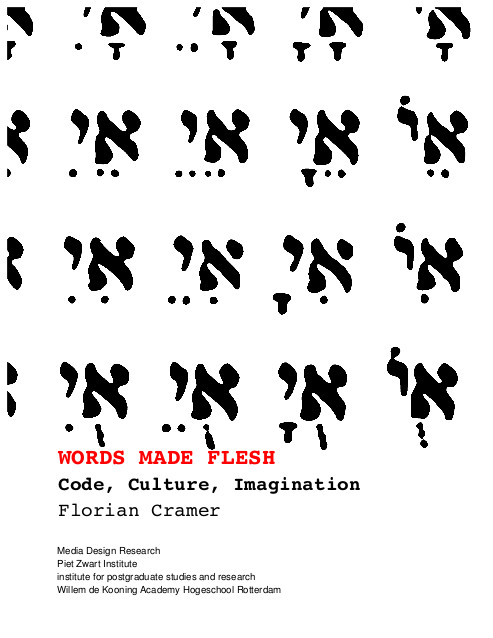Stephen Wolfram: A New Kind of Science (2002)
Filed under book | Tags: · biology, cellular automata, computation, mathematics, philosophy of science, physics, science, systems science

This long-awaited work from one of the world’s most respected scientists presents a series of dramatic discoveries never before made public. Starting from a collection of simple computer experiments–illustrated in the book by striking computer graphics–Stephen Wolfram shows how their unexpected results force a whole new way of looking at the operation of our universe.
Wolfram uses his approach to tackle a remarkable array of fundamental problems in science, from the origins of apparent randomness in physical systems, to the development of complexity in biology, the ultimate scope and limitations of mathematics, the possibility of a truly fundamental theory of physics, the interplay between free will and determinism, and the character of intelligence in the universe.
Written with exceptional clarity, and illustrated by nearly a thousand original pictures, this seminal book allows scientists and nonscientists alike to participate in what promises to be a major intellectual revolution.
Publisher Wolfram Media Inc, 2002
ISBN 1579550193, 9781579550196
348 pages
PDF (updated on 2013-1-23)
View online
Heinz von Foerster: Understanding Understanding. Essays on Cybernetics and Cognition (2003)
Filed under book | Tags: · cognition, computation, cybernetics, knowledge, theory of communication

“In these essays Heinz von Foerster discusses some of the fundamental principles that govern how we know the world and how we process the information from which we derive that knowledge. Included are path- breaking articles concerning the principles of computation in neural nets (1967), the definition of self-organizing systems (1960), the nature of cognition (1970), as well as recent expansions on these themes (e.g. “How recursive is communication,” 1993). Working with Norbert Wiener, Warren McCullough, and others in the 1960s and 1970s, von Foerster was one of the founders of the science of cybernetics, which has had profound effects both on modern systems theory and on the philosophy of cognition. At the Biological Computer Laboratory at the University of Illinois he produced the first parallel computers and contributed to many other developments in the theory of computation and cognition.”
Publisher Springer, 2003
ISBN 0387953922, 9780387953922
xii+362 pages
PDF (updated on 2020-4-17)
Comment (0)Florian Cramer: Words Made Flesh: Code, Culture, Imagination (2005)
Filed under book | Tags: · art, art history, code, code poetry, computation, experimental literature, kabbalah, language, literature, philosophy, poetry, religion, software, software art, technology

“Executable code existed centuries before the invention of the computer in magic, Kabbalah, musical composition and experimental poetry. These practices are often neglected as a historical pretext of contemporary software culture and electronic arts. Above all, they link computations to a vast speculative imagination that encompasses art, language, technology, philosophy and religion. These speculations in turn inscribe themselves into the technology. Since even the most simple formalism requires symbols with which it can be expressed, and symbols have cultural connotations, any code is loaded with meaning. This booklet writes a small cultural history of imaginative computation, reconstructing both the obsessive persistence and contradictory mutations of the phantasm that symbols turn physical, and words are made flesh.”
Editor: Matthew Fuller, additional corrections: T. Peal
Published within Media Design Research programme, Piet Zwart Institute, Willem de Kooning Academy Hogeschool, Rotterdam
GNU General Public License 2; GNU Free Documentation License 1.2; Creative Commons Attribution-ShareAlike License 2.0
141 pages
Review: Tomáš Javůrek (Joinme, 2018, CZ).
PDF (updated on 2012-10-11)
HTML (added on 2013-7-1)
Sequel: Exe.cut(up)able statements: Poetische Kalküle und Phantasmen des selbstausführenden Texts (2011, in German).
Comment (0)
